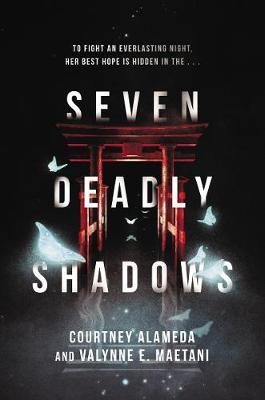I should’ve enjoyed this a lot more than I did. It was a loose reimagining of the movie Seven Samurai featuring shrine maidens, kitsune, and shingami; what could I possibly not love about that? Quite a bit, apparently. But despite its imperfections, Seven Deadly Shadows offers a beautifully accurate look at Japanese culture, and for that alone, I would recommend it.
WHAT I LIKED:
🇯🇵 The Japanese Culture! As somebody who proudly places their "Home Sweet Home" welcome mat outside a small apartment in the far-flung suburbs of Tokyo, when I see a book that's set in Japan or that's Japanese-inspired, I get so dang excite that I forget the finer points of grammar.
Seeing the people, language, and country that I've grown to adore so much realistically captured in words and ink is a kind of magic that rivals that of Disneyland. And this book definitely delivers on that front. Alameda and Maetani go to great lengths to accurately depict the distinct personalities of both Tokyo and Kyoto, as well as Japanese culture as a whole. The characters’ reactions to certain social situations felt very authentic to me; they mirrored what I’ve experienced and observed every day here in Japan.
I appreciate that this book didn’t let Japan and its culture become some exotic backdrop or a mere marketing pitch. Instead, the authors let the setting become more than that – they let it dictate every aspect of the narrative in a thoughtful and sensitive way. Seven Deadly Shadows isn’t just set in Japan, it's intrinsically Japanese.
WHAT I LIKED... LESS:
👥 The Characters! This story had all the trappings for a fantabulous found family. First there’s Kira, our resident unflinching heroine. By day, she's your ordinary high school student, and by night, she's a noble yokai-fighting shrine maiden. (Talk about some serious Sailor Mars vibes.) Next comes Shiro, Kira’s loyal kitsune shrine-guardian-slash-love-interest (who should probably be in a J-Pop band or something because he’s just that ridiculously good looking). And I can’t forget to mention the shinigami, a ragtag group of death god rejects who dress like old-time samurai and cook mouth-watering ramen in their free time. Because heck, why not?
There was so much potential energy stored up in these characters, it was like I was back in one of my dreaded college physics lectures. But although there was potential, they failed to become anything more than just words on a page to me. To paraphrase something Phil from Disney’s Hercules once said: “Every single one of them let me down, flatter than a discus.”
I’ve especially got some Kobe beef to pick with Shiro, whose entire lackluster personality seemed to hinge on his adoring cheerleader act for Kira, and his ability to tenderly cup her face in his soft palms.
✍️ The Writing Style! The writing in this book was ultimately one big “Tell-and-Tell” fest, with the "showing" part largely absent. For example, when initially introducing Kira, we're met with this inner dialogue: "In spite of my efforts, I stand out. A lot." Instead of showing us through a specific scene or scenario that Kira stands out, Alameda and Maetani just flat out tell us. And not in a particularly eloquent way, either. This constant telling instead of showing made the writing feel slightly juvenile in nature and ended up distancing me from both the story and the action. It could also be the reason I didn’t really click with any of the characters.
